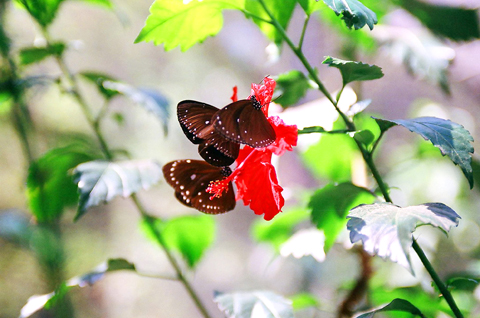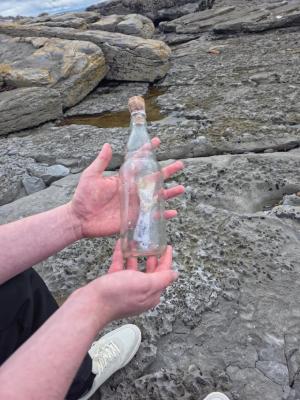Bathed in spring sunshine, thousands of purple crow butterflies alight in the woods near Pingding (坪頂) in south-central Taiwan to feed on nectar on a recent Sunday, gathering strength before continuing on their long journey back to their breeding grounds in the north.
Guided by their teachers, young students from the area concentrate on recording the number of the insects passing by. At times, the teachers catch the delicate creatures with nets and quickly tag their wings with an identifying mark before setting them free.
“The ‘capture and release’ strategy is part of our long-term campaign to track the species’ migratory routes for educational and conservation purposes,” said Huang Hsi-pei, academic affairs director of Chengkung Elementary School in Yunlin County.

PHOTO: CNA
This grassroots educational drive is a welcome change from previous decades, when the “butterfly kingdom” — as Taiwan is known in some circles — was a killing field for the colorful winged creatures during their seasonal migrations.
A lack of interest in conservation led to the extinction of two precious species — the king crow and tailed cupid — in the 1960s, but today, butterfly preservation is a high enough priority that even Taiwan’s freeway bureau has blocked off sections of road to prevent the purple crows from being squashed by passing cars.
Conservationists would like to see even more efforts by the government, but they said efforts by the freeway bureau and programs such as those conducted by the elementary school are a good start to a long-term solution — protecting the butterflies’ natural habitat and making butterfly conservation a widespread public concern.
The purple crow butterflies provide an example of how vulnerable fragile insects are to human encroachment on their natural habitats and how a little effort by the government and society can make a big difference.
“Butterflies are such delicate creatures that once you destroy the plants they rely on, they have little chance of survival,” said Chan Chia-lung (詹家龍), an entomologist-turned-conservationist who won an award in Japan last year for his long-term observation of the species.
After years of extensive tracking by conservation experts and volunteers, it was discovered that purple crow butterflies spend the winter in Taiwan’s warmer southern region to escape the winter cold in the north.
In October each year, instinct draws the butterflies to take refuge in low-lying valleys on the two sides of the southern foothills of Taiwan’s Central Mountain Range, most notably Maolin (茂林) in Kaohsiung County and Dawu (大武) in Taitung County, where they winter until March.
At the onset of spring, the butterflies begin a 400km migration back to their northern habitats, following a variety of routes from Maolin and Dawu until they reach the hillside village of Pingding, where they converge in the thousands or even millions before crossing the Choshui River (濁水溪). The butterflies then fly to different destinations in central, northern and northeastern Taiwan, where they fulfill their most important mission — to mate and lay their eggs.
This “butterfly highway” offers an incredibly rare spectacle, with the monarch butterfly in Mexico being the only other butterfly species to migrate like birds and winter in a particular valley, Chan said.
“The sight of hundreds of thousands of butterflies with purple wings that appear to change color as they catch the sunlight at different angles is a thrill for many people,” he said.
Yet this rare migratory pattern has led to the deaths of thousands of butterflies as motorists run into them on Freeway No. 3, which lies along their migratory path. However, measures taken by the National Freeway Bureau over the past three years have resulted in a significant decline in the road-kill rate.
A study by National Taiwan University entomology professor Yang Ping-shih (楊平世) showed that the number of butterflies killed by cars declined from 3 percent of the flock in 2007 to 0.3 percent last year.
Encouraged by the progress, the bureau this year expanded the section of the freeway to be closed during the migration peak period to 3km from the previous 2km and extended a security net to 660m from 460m to encourage the butterflies to fly higher, avoiding the traffic.
“The protective measures are very special. They can only be found in Taiwan. We are proud to be spending a little money to offer some protection for the butterflies and the environment,” National Freeway Bureau Director-General Lee Thay-ming (李泰明) said.
Butterfly populations in Taiwan, which has one of the world’s highest butterfly densities, were decimated by commercial collecting, particularly in the 1960s, when they were sold by the kilogram to collectors. The practice of capturing large numbers of butterflies for commercial use is rare today, because it is no longer profitable.
Today, human encroachment remains the greatest threat to the insects.
Chan said about 200,000 butterflies disappeared as a result of the construction of a parking lot in Maolin to accommodate tourists in the 1990s.
To prevent similar problems, an area has now been marked off as a butterfly sanctuary in the Maolin National Scenic Area. It is part of a conservation program sponsored by the Council of Agriculture that includes the cultivation of plants upon which the insects feed.
“I hope the latest steps to provide the purple crows safer passage during their migration, coupled with a greater public awareness of the problems they face, can help increase butterfly populations,” Chan said.
Some conservation experts share his view, arguing that more must be done if Taiwan is to keep its reputation as a “butterfly kingdom.”
Hsu Yu-feng (徐堉峰), an entomology professor at National Taiwan Normal University, said butterfly numbers provide an important indicator of the state of the environment.
Butterfly numbers have fallen from a high of 11,500 butterflies per minute recorded during the 2005 migration period, experts said.
“A decline in the butterfly population could signal a deterioration of our environment, so we have to pay more attention to the environment and protection of butterfly habitats,” Hsu said.
Also See: Britain's disappearing butterflies

‘NON-RED’: Taiwan and Ireland should work together to foster a values-driven, democratic economic system, leveraging their complementary industries, Lai said President William Lai (賴清德) yesterday expressed hopes for closer ties between Taiwan and Ireland, and that both countries could collaborate to create a values-driven, democracy-centered economic system. He made the remarks while meeting with an Irish cross-party parliamentary delegation visiting Taiwan. The delegation, led by John McGuinness, deputy speaker of the Irish house of representatives, known as the Dail, includes Irish lawmakers Malcolm Byrne, Barry Ward, Ken O’Flynn and Teresa Costello. McGuinness, who chairs the Ireland-Taiwan Parliamentary Friendship Association, is a friend of Taiwan, and under his leadership, the association’s influence has grown over the past few years, Lai said. Ireland is

FINAL COUNTDOWN: About 50,000 attended a pro-recall rally yesterday, while the KMT and the TPP plan to rally against the recall votes today Democracy activists, together with arts and education representatives, yesterday organized a motorcade, while thousands gathered on Ketagalan Boulevard in Taipei in the evening in support of tomorrow’s recall votes. Recall votes for 24 Chinese Nationalist Party (KMT) lawmakers and suspended Hsinchu City mayor Ann Kao (高虹安) are to be held tomorrow, while recall votes for seven other KMT lawmakers are scheduled for Aug. 23. The afternoon motorcade was led by the Spring Breeze Culture and Arts Foundation, the Tyzen Hsiao Foundation and the Friends of Lee Teng-hui Association, and was joined by delegates from the Taiwan Statebuilding Party and the Taiwan Solidarity

An SOS message in a bottle has been found in Ireland that is believed to have come from the Taiwanese captain of fishing vessel Yong Yu Sing No. 18 (永裕興18號), who has been missing without a trace for over four years, along with nine Indonesian crew members. The vessel, registered to Suao (蘇澳), went missing near Hawaii on Dec. 30, 2020. The ship has since been recovered, but the 10 crew members have never been found. The captain, surnamed Lee (李), is believed to have signed the note with his name. A post appeared on Reddit on Tuesday after a man

A saleswoman, surnamed Chen (陳), earlier this month was handed an 18-month prison term for embezzling more than 2,000 pairs of shoes while working at a department store in Tainan. The Tainan District Court convicted Chen of embezzlement in a ruling on July 7, sentencing her to prison for illegally profiting NT$7.32 million (US$248,929) at the expense of her employer. Chen was also given the opportunity to reach a financial settlement, but she declined. Chen was responsible for the sales counter of Nike shoes at Tainan’s Shinkong Mitsukoshi Zhongshan branch, where she had been employed since October 2019. She had previously worked